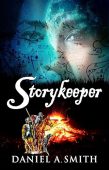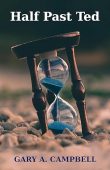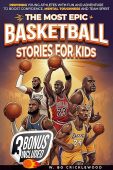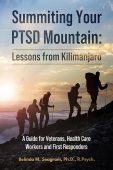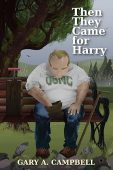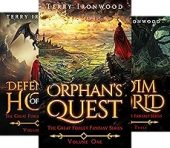The Hunger Games, The Maze Runner, and Divergent are a few of the most popular series in recent years, and they each share a common theme: each book is set in a dystopia. A dystopia is defined as a society that has widespread, horrifying conditions, such as a cruel police state or mass oppression.
A Short History of Dystopian Literature
A dystopian novel can often be a type of political warning. Authors commonly reference a current societal trend, but take it to the extreme to show its possible negative outcomes. Examples of this begin in the late 1800’s:
- 1899: H.G. Wells published the first novels portraying dystopian futures: The Story of the Days to Come, and When the Sleeper Wakes.
- 1907: Jack London writes The Iron Heel, in which a socialist movement overthrows an oppressive government.
- 1921: Yevgeny Zamyatin publishes We, a grim novel describing a totalitarian government that controls every part of people’s lives.
- 1932: Brave New World by Aldous Huxley is about an oppressed civilization that actually begins to adore the same government that has taken away all their individuality and free thought.
- 1949: George Orwell’s novel, 1984, portrays characters under constant government surveillance, coining the term “Big Brother.”
- 1953: Ray Bradbury’s Fahrenheit 451 is set in a dystopia where books are illegal and therefore need to be burned.
- 1962: A Clockwork Orange by Anthony Burgess follows a subject as the government brainwashes him and completely changes his character.
Dystopia or Utopia?
Oftentimes, a dystopia in a work of fiction is the result of peoples efforts to create a “perfect” society, or a utopia. As us humans are notoriously imperfect, perfection takes on the form of a government taking drastic measures to eliminate crime and rebellion. An oppressive government is just one of the common attributes found in dystopian literature. Other tropes include:
- Extinguishing individuality and the arts (“sameness” promotes peace).
- Choosing to follow orders or risking everything to rebel (self-exploration).
- Grim or unresolved endings (consequences of complacency).
Does Gender Matter in a Dystopia?
Dystopian fiction has historically depicted male and female protagonists in rather stereotypical ways; male protagonists are commonly strong and independent, while female characters still tend to be more “nurturing” and usually need help from others to succeed. In some novels, this may simply be due to engrained sexism, but this gender imbalance can also be used as part of the author’s message.
Women have been fighting for equal rights for hundreds of years, but even in today’s society, there is still gender discrimination, wage differences, and other examples of unfair treatment. Dystopian novels can describe possible consequences of what may happen if people continue to treat men and women as unequals. Many recently published dystopian novels feature women leads, reflecting both a want to move away from stereotype roles and a fear that gender equality has stalled or may be reversing.
5 Recommended Dystopian Novels
We narrowed down a long list of dystopian literature to choose our top 5 recommendations for your next dystopian novel!
The Handmaid’s Tale by Margaret Atwood
This wildly popular dystopian novel is set in the not-so-distant future in what used to be America. The U.S. is now known as the Republic of Gilead, and its inhabitants take every word of the Book of Genesis literally. The main character Offred, a handmaid within the new regime, describes the disturbing and intolerant views that people have come to believe and the consequences of their faith.
Ready Player One by Ernest Cline
This worldwide best seller is set in the year 2045, where virtual reality has become the norm. Teenager Wade Watts is obsessed with exploring the digital world because power and wealth is promised to anyone who can solve a puzzle embedded into a multiplayer online game. But after discovering the first clue, Wade will have to face numerous adversaries in both the virtual and physical worlds to claim the ultimate prize.
Station Eleven by Emily St. John Mandel
The first sign of the illness was the untimely heart attack of a Hollywood star. Within weeks, the world was overtaken by an epidemic. This thriller is set twenty years after the epidemic and follows a small group of musicians and artists who are dedicated to preserving the arts. After wandering into the wrong region, they find themselves being threatened by a dangerous and violent prophet. Will art and music be lost from humanity forever?
Brilliance by Marcus Sakey
In a world eerily similar to our own, this book tells the story of “Brilliants,” people who are born with certain gifts. Federal Agent Nick Cooper is a Brilliant who’s gifted at tracking down terrorists. However, when he’s assigned to find one of the most dangerous men alive, Nick begins to question how much he’s willing to give up to capture his target.
The Atopia Chronicles by Matthew Mather
This first book in Maher’s trilogy describes a huge, man-made island that provides Earth’s inhabitants an escape from pollution and overpopulation. Well, for the elite and wealthy inhabitants, at least. On this island, Dr. Patricia Killiam is assigned the enormous task of finding a way to save the planet from the destruction of mankind.
Looking to get immersed into a dystopian world on your next reading adventure? Visit JustKindleBooks.com to learn how you can access thousands of free Kindle books.





